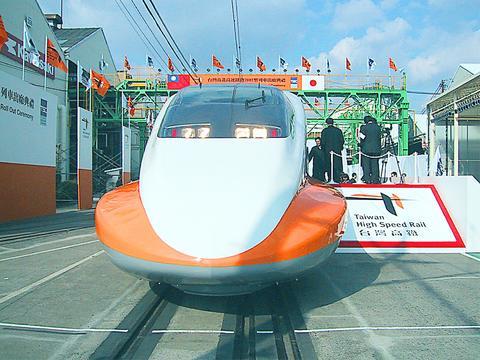The first of the newly completed passenger cars for the Taiwan High Speed Railway were unveiled to the public yesterday morning in Kobe.
"The inauguration of the high-speed railway will be the nation's second transportation revolution, following the completion of the first national freeway," said Minister of Transportation and Communications Lin Ling-san (
The 700T-model railway cars -- manufactured by Taiwan Shinkansen Corp, a joint venture between Kawasaki Heavy Industries and other Japanese companies -- were exhibited yesterday during a roll-out ceremony that began with the playing of the national anthems of the Republic of China (ROC) and Japan.

PHOTO: JOY SU, TAIPEI TIMES
"It's been a long time since the ROC flag was flown in a public arena in Japan. Seeing the flags of both nations flown today at the roll-out ceremony, as well as hearing both national anthems, I am very moved and proud," Lin said.
Lin also said he hoped that the future would afford more opportunities for cooperation and that the friendship between the two nations could reach a point of stability.
"Forty years ago, Japan completed its first high-speed railway line. Today, the Taiwan High Speed Railway 700T cars have become the first international output for the Japanese high-speed railway system. For both nations, this achievement carries historic significance," said Nita Ing (
Lin noted that the high-speed railway was already 53 percent complete and that construction of the civil works portion was 93 percent complete.
Lin said the 700T trains incorporated the latest in technology, with the T standing for Taiwan because they were custom made for the Taiwanese market.
The trains, costing NT$100 million per set, differ significantly from their Japanese counterparts. In addition to an exterior specifically designed to withstand Taiwan's hotter, more humid climate, the trains are capable of traveling as fast as 300 kph. Japan's trains can only travel as fast as 285 kph.
Trains on the northern portion of the high-speed rail line will travel at 285kph, but maintain a speed of 300kph between Tai-chung and the south.
Ing also announced another difference -- smoking will not be permitted on the trains.
Each train will accommodate a total of 989 passengers -- 66 in business class and the rest in the standard-class cars.
The color scheme of the standard-class cars is green. Passengers will be seated five abreast, with three on one side of the aisle and two on the other. The cars will be equipped with bathrooms, vending machines and telephone booths.
According to THSRC officials, the trains will be shipped to Taiwan in May and undergo testing in Kaohsiung in September. The railway, a NT$560 billion project, is scheduled to begin operations in October next year.
As for what will happen to the Taiwan Railway Administration after the high-speed rail line goes into operation, Lin assured the media that after the Lunar New Year strike threat, the TRA was very clear as to what its future operations would be.
He said the eastern region would become the TRA's main market.
Lin said the next task was to formulate guidelines to guarantee smooth operations after the high-speed railway is launched.

AGING: As of last month, people aged 65 or older accounted for 20.06 percent of the total population and the number of couples who got married fell by 18,685 from 2024 Taiwan has surpassed South Korea as the country least willing to have children, with an annual crude birthrate of 4.62 per 1,000 people, Ministry of the Interior data showed yesterday. The nation was previously ranked the second-lowest country in terms of total fertility rate, or the average number of children a woman has in her lifetime. However, South Korea’s fertility rate began to recover from 2023, with total fertility rate rising from 0.72 and estimated to reach 0.82 to 0.85 by last year, and the crude birthrate projected at 6.7 per 1,000 people. Japan’s crude birthrate was projected to fall below six,

Conflict with Taiwan could leave China with “massive economic disruption, catastrophic military losses, significant social unrest, and devastating sanctions,” a US think tank said in a report released on Monday. The German Marshall Fund released a report titled If China Attacks Taiwan: The Consequences for China of “Minor Conflict” and “Major War” Scenarios. The report details the “massive” economic, military, social and international costs to China in the event of a minor conflict or major war with Taiwan, estimating that the Chinese People’s Liberation Army (PLA) could sustain losses of more than half of its active-duty ground forces, including 100,000 troops. Understanding Chinese

SELF-DEFENSE: Tokyo has accelerated its spending goal and its defense minister said the nation needs to discuss whether it should develop nuclear-powered submarines China is ramping up objections to what it sees as Japan’s desire to acquire nuclear weapons, despite Tokyo’s longstanding renunciation of such arms, deepening another fissure in the two neighbors’ increasingly tense ties. In what appears to be a concerted effort, China’s foreign and defense ministries issued statements on Thursday condemning alleged remilitarism efforts by Tokyo. The remarks came as two of the country’s top think tanks jointly issued a 29-page report framing actions by “right-wing forces” in Japan as posing a “serious threat” to world peace. While that report did not define “right-wing forces,” the Chinese Ministry of Foreign Affairs was

US President Donald Trump in an interview with the New York Times published on Thursday said that “it’s up to” Chinese President Xi Jinping (習近平) what China does on Taiwan, but that he would be “very unhappy” with a change in the “status quo.” “He [Xi] considers it to be a part of China, and that’s up to him what he’s going to be doing, but I’ve expressed to him that I would be very unhappy if he did that, and I don’t think he’ll do that. I hope he doesn’t do that,” Trump said. Trump made the comments in the context